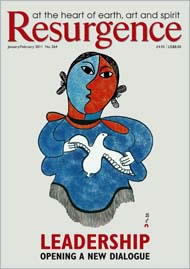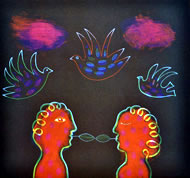As a writer and psychotherapist, I have been using words carefully most of my life. While counselling a husband and wife, I notice that a single word can stir their emotions and take their conversation to a dark place they both know is negative.
If, for example, I use a word like ‘neurotic’ or even ‘troubled’ in talking to a client about his situation, he may feel judged and become defensive. On the other hand, a few honest words of appreciation can put a marriage back on track.
Words don’t just convey meaning: they are a force.
We live at a time when people are generally pragmatic. We want to be effective and we don’t care much about the words we use. We see signs of this carelessness in advertising, where grammar and spelling are secondary to perkiness and brevity. People drink lite sodas and are purchasing new tech (technology) for their business offices, and apps (applications) for their telephones.
Of course language evolves, but you can usually sense the difference between evolution and neglect. Smoothing out a word like ‘light’ into ‘lite’, we lose its history and associations. The word ultimately goes back to leukos in Greek and is related to leukaemia, a problem of white blood cells. We don’t sound the ‘gh’, but its presence there keeps the memory of the Greek associations.
In my own writing I try to find a midpoint between pedanticism and love of language. I know what I’m talking about, because I was once fired from a teaching position at a university in part because I didn’t write in acceptable academic style. Apparently, my words didn’t have sufficient or appropriate gravitas.
A Rumi story tells of a dervish walking past a deep well. He hears a voice:
“Help. I’m a writer and I’m stuck down here.”
The dervish says, “I’ll go find out where a ladder’s at.”
“Your grammar’s atrocious,” the writer shouts up.
“Well, then, you’ll have to wait there until my grammar improves,” the dervish says, and walks on.
I feel like the writer in the well waiting for grammar to improve. And not just grammar. I understand the Sufi complaint about being too fussy about rules of speech. I’m waiting, too, for a love of language to return, an appreciation for the words we use and for style and grace in expression. Like the writer in the well, I could be in for a long wait.
World leaders often use diplomatic language that hides the real meaning of the words, creating euphemisms that are outright dangerous. Describing slaughtered and maimed civilians as “collateral damage” is the classic example for our times, and it’s cynical in the extreme. “Enhanced interrogation techniques” for ‘torture’ seems part of the cruelty.
The bland and bloated language of politics blocks the opportunity for leaders to truly inspire and educate. Imagine hearing instead a thoughtful, measured analysis of the world situation from a leader, accompanied by intelligent, subtle solutions to problems. Instead, we get the tired and unimaginative language of war and militancy. Wars begin with words, so we should be careful how we speak, especially to nations where there is tension. Our words can heal the situation before the military takes up its weapons.
We could all have a rule that we won’t use words that come to us unconsciously and out of habit or that are in the common parlance of public discourse. Fresh words could help us arrive at fresh ideas, for there is an intimate connection between thought and word. Careful use of words requires careful thinking.
Sometimes I wonder if the language of progressive movements gets in the way of the message. I, for one, always stumble at the word ‘sustainability’. When I think about it, I know what it means, but it doesn’t feel like a friendly word. I’d rather talk about not being wasteful, or about using resources carefully and wisely. ‘Environmentalism’ isn’t such a friendly word either. Maybe we need a new, simple word or phrase – ‘care for the world’.
World peace begins with peace in the family. As a therapist, I’ve heard many adults recite hurtful words they heard decades ago from a parent or sibling. Care in speaking to children requires a degree of self-possession, the ability to see past the blind emotion of the moment to the needs of the child. Good words come from that greater vision.
For example, words of extreme praise can do wonders for the injured ego of a child or spouse. Sometimes it’s helpful to give words to what is usually left unspoken. “I appreciate what you did for me. I’m happy that you’re with me.” Simple, direct and felt words of praise, appreciation and gratitude often go unsaid, when they could be a handy means of healing. Words hurt and words heal.
Every day offers opportunities to say words of encouragement and recognition. No matter how strong or successful we are, we all need such words. But often they may seem unnecessary. My rule is: if the thought occurs to me to say something supportive, I say it. You can never speak too often in praise and appreciation. You can also receive that praise, when it comes, gracefully – with words. “Thank you for saying that. I need to hear that.”
A friend of our family, an intelligent, progressive Catholic priest, always praises our children to the skies. He is extravagant in his language, and everyone knows he overdoes it with his praise. But we all love to see him, and we treasure his friendship. We don’t need realism and moderation from such a friend.
Everywhere today marriage partners and children are in distress. I have no doubt that one simple solution would be to offer them words of support. When used with care, language can be therapeutic. Even, and maybe especially, when a person is being difficult and belligerent, words of understanding and affirmation, realistic and felt, can often help.
Years ago I was trained as a counsellor according to Carl Rogers’ method. He advised using simple words that let a person know he is heard and understood. On paper such words sound stiff: “I really hear what you’re saying. You’re tired of speaking without being heard.” But if you mean what you say, your plain words can have immense power. The simple Rogerian method could help many a troubled relationship and many a spluttering politician.
As a therapist, I’m aware that ‘talk therapy’ has a poor reputation in places where a materialistic philosophy of drug treatments and behaviour management is strong. This turn away from the power of spoken interaction is part of the larger myth of our time: the enthronement of a materialistic and mechanistic world. But I still believe in the power of language, its capacity to hurt and to heal.
Our physical world is polluted with dangerous chemicals, but our language, too, suffers its own kind of pollution. This is an ecological problem that we can solve in our personal lives by learning about language and using it with care and imagination. The flow of our words could be as clear and fresh as the cascade of an unpolluted, free-flowing stream. We could then choose our words the way we plant a garden – thoughtfully and with an eye to beauty.







